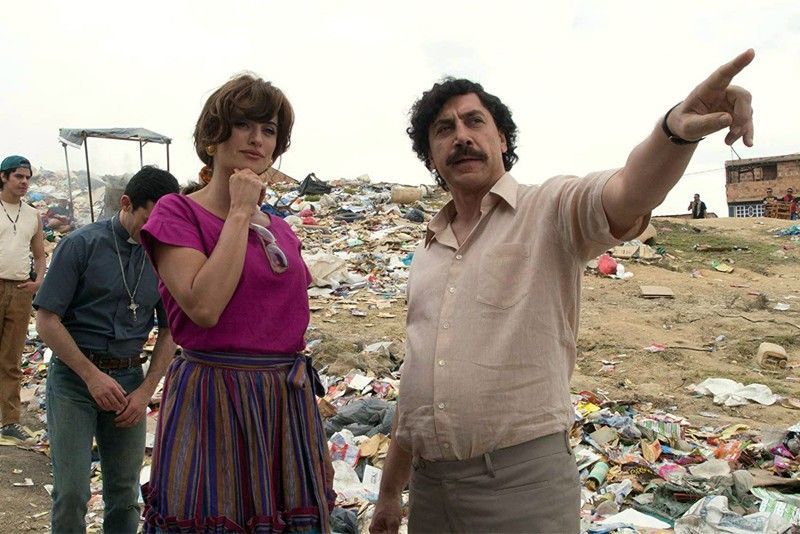Not much to love

Film review: Loving Pablo
MANILA, Philippines — Fans of Netflix’s critically-acclaimed series Narcos (2015) will undoubtedly be quite familiar with the story of Pablo Escobar Gaviria, who dominated Colombia’s drug trade in the ‘80s until his death in 1993. This is the main handicap of Fernando Leon de Aranoa’s Loving Pablo; with at least four previous movies and documentaries dealing with the biography of the infamous narcotraficante, viewers will be expecting Aranoa to reinvent the wheel, so to speak. And what a heavy burden that is.
The latest Escobar opus, this time based on the book Loving Pablo, Hating Escobar, a tell-all by the drug kingpin’s favorite mistress, Colombian celebrity news hen Virginia Vallejo, tries earnestly by using a new tack: it is told from the point-of-view of the aforestated paramour.
The film opens in medias res: Vallejo (played with aplomb by Penelope Cruz) is on a private jet fleeing Colombia. In a voice-over, she intimates that “I have often left a house in the middle of the night because of a man. But I have never left a country because of one.” She is on the way to the United States, having been taken into protective custody by the US Drug Enforcement Agency to testify against the Medellin Cartel.
Flashback several years: Valleja is one of the special guests in a lavish party being thrown by Escobar (played by Javier Bardem, Penelope’s real-life husband). Ostensibly the launching of a charity for the slum dwellers of Medellin, it is really to celebrate the founding of the Medellin Cartel. They meet, and the attraction is almost instantaneous: she is seduced by his wealth and display of power; he, by her beauty, glamor and media clout.
In short order, they become lovers, although Escobar manages to skillfully juggle blissful domestic life with wife Tata (Julieth Restrepo) and Vallejo. Thence follows the familiar recitation of Escobar’s life story: he runs for Colombia’s House of Representatives “to get respect” and wins handily, but is booted out by his new colleagues due to his underworld connections; he retaliates by ordering —in the most brazen manner — the killing of the government officials who humiliated him. The government tries to crack down on his criminal organization; he reacts by killing policemen and bombing an aircraft in midflight. Then, the police descends upon Medellin, killing everyone suspected to be associated with Escobar. Eventually, the violence escalates to such heights that Escobar is forced to capitulate. He surrenders, on condition that he is detained in a prison that he himself has built.
His incarceration is hardly a penalty: his “jail” is an opulent mansion complete with billiard halls, an in-house disco regularly visited by prostitutes trucked in from outside, a luxurious office from where he continues running his drug empire and his own soccer field, among other profligate amenities. Chillingly reminiscent of the fancy accommodations of inmates in our own Bilibid Prison as uncovered by a recent Congressional investigation!
Nonetheless, Escobar feels hemmed-in and escapes, leading to a nationwide manhunt by the Colombian military (instigated in great part by the US as part of its hardline stand against international cocaine trafficking), which results in his decline and eventual downfall.
Bardem, one of today’s finest character actors, is in great form as he essays the lead role. He is, however, handicapped by the script’s lack of substance. In Narcos, Portuguese actor Wagner Moura’s Escobar is more deeply nuanced, more fleshed-out, having been given some 30 episodes within which the drama — complete with back-stories — could play out. No such luxury of chronological sprawl here as the writing appears to be a summary of the Narcos script, with certain major turns left out. The result is that Bardem’s Escobar characterization, compressed to two hours, is left with scant triggers and motivations.
The movie fails to fully explain why Escobar is what he was: a seeming Jekyll-and-Hyde gangster with a soft spot for the poor yet a ruthless passion for cold-bloodedly killing his enemies; a devoted family man who is eager to please his wife and children but a relentless womanizer who, aside from Vallejo, beds even pubescent slum girls handed to him by their parents for mercenary considerations.
Yet, Bardem tries with all the skills at his disposal. Although merely vaguely resembling the real Escobar, even with the curly wig and fake beer belly, what he successfully set out to do is not an impersonation, but an interpretation. And what he gives us, within the constraints of a watery script, is an honest reading of a character. Cruz also acts up a storm as a renowned television reporter uncontrollably drawn into the world of a criminal gradually transforming into a loathsome monster, falling dangerously in love in spite of his hatefulness. The attraction proves ultimately fatal not only to her career, but her reputation and the life she has known, as well. The reaction shot of her looking out of her hotel room after learning of Pablo’s death — a mixture of grief, pain and relief — is reason for awe.
But except for the bravura performances of Bardem and Cruz, the movie has not much else to recommend it by way of new insights into the life of perhaps one of the best-known felons in modern history. What it does is offer some perceptions into the inner workings both of government, media and crime organizations, with the film sending the message that not only is there not much difference among the three, but that they are oftentimes inextricably intertwined.
“I don’t care how Pablo gets his money, only how he uses it,” declares the journalist in Virginia after seeing how many houses Escobar has built for the poor, drawing a parallel between him and Colombia’s corrupt officials. And when a colleague asks Vallejo pointblank whether she is doing public relations for Escobar because he is helping her or the people, she replies curtly, “Why, am I not part of the people?”
In sum, while there is not much to love in Loving Pablo, it is still valuable as a reiteration of the cautionary tale that love and power corrupt, and that absolutely love, like absolute power, corrupts absolutely.
Fans of Netflix’s critically-acclaimed series Narcos (2015) will undoubtedly be quite familiar with the story of Pablo Escobar Gaviria, who dominated Colombia’s drug trade in the ‘80s until his death in 1993. This is the main handicap of Fernando Leon de Aranoa’s Loving Pablo; with at least four previous movies and documentaries dealing with the biography of the infamous narcotraficante, viewers will be expecting Aranoa to reinvent the wheel, so to speak. And what a heavy burden that is.
The latest Escobar opus, this time based on the book Loving Pablo, Hating Escobar, a tell-all by the drug kingpin’s favorite mistress, Colombian celebrity news hen Virginia Vallejo, tries earnestly by using a new tack: it is told from the point-of-view of the aforestated paramour.
The film opens in medias res: Vallejo (played with aplomb by Penelope Cruz) is on a private jet fleeing Colombia. In a voice-over, she intimates that “I have often left a house in the middle of the night because of a man. But I have never left a country because of one.” She is on the way to the United States, having been taken into protective custody by the US Drug Enforcement Agency to testify against the Medellin Cartel.
Flashback several years: Valleja is one of the special guests in a lavish party being thrown by Escobar (played by Javier Bardem, Penelope’s real-life husband). Ostensibly the launching of a charity for the slum dwellers of Medellin, it is really to celebrate the founding of the Medellin Cartel. They meet, and the attraction is almost instantaneous: she is seduced by his wealth and display of power; he, by her beauty, glamor and media clout.
In short order, they become lovers, although Escobar manages to skillfully juggle blissful domestic life with wife Tata (Julieth Restrepo) and Vallejo. Thence follows the familiar recitation of Escobar’s life story: he runs for Colombia’s House of Representatives “to get respect” and wins handily, but is booted out by his new colleagues due to his underworld connections; he retaliates by ordering —in the most brazen manner — the killing of the government officials who humiliated him. The government tries to crack down on his criminal organization; he reacts by killing policemen and bombing an aircraft in midflight. Then, the police descends upon Medellin, killing everyone suspected to be associated with Escobar. Eventually, the violence escalates to such heights that Escobar is forced to capitulate. He surrenders, on condition that he is detained in a prison that he himself has built.
His incarceration is hardly a penalty: his “jail” is an opulent mansion complete with billiard halls, an in-house disco regularly visited by prostitutes trucked in from outside, a luxurious office from where he continues running his drug empire and his own soccer field, among other profligate amenities. Chillingly reminiscent of the fancy accommodations of inmates in our own Bilibid Prison as uncovered by a recent Congressional investigation!
Nonetheless, Escobar feels hemmed-in and escapes, leading to a nationwide manhunt by the Colombian military (instigated in great part by the US as part of its hardline stand against international cocaine trafficking), which results in his decline and eventual downfall.
Bardem, one of today’s finest character actors, is in great form as he essays the lead role. He is, however, handicapped by the script’s lack of substance. In Narcos, Portuguese actor Wagner Moura’s Escobar is more deeply nuanced, more fleshed-out, having been given some 30 episodes within which the drama — complete with back-stories — could play out. No such luxury of chronological sprawl here as the writing appears to be a summary of the Narcos script, with certain major turns left out. The result is that Bardem’s Escobar characterization, compressed to two hours, is left with scant triggers and motivations.
The movie fails to fully explain why Escobar is what he was: a seeming Jekyll-and-Hyde gangster with a soft spot for the poor yet a ruthless passion for cold-bloodedly killing his enemies; a devoted family man who is eager to please his wife and children but a relentless womanizer who, aside from Vallejo, beds even pubescent slum girls handed to him by their parents for mercenary considerations.
Yet, Bardem tries with all the skills at his disposal. Although merely vaguely resembling the real Escobar, even with the curly wig and fake beer belly, what he successfully set out to do is not an impersonation, but an interpretation. And what he gives us, within the constraints of a watery script, is an honest reading of a character. Cruz also acts up a storm as a renowned television reporter uncontrollably drawn into the world of a criminal gradually transforming into a loathsome monster, falling dangerously in love in spite of his hatefulness. The attraction proves ultimately fatal not only to her career, but her reputation and the life she has known, as well. The reaction shot of her looking out of her hotel room after learning of Pablo’s death — a mixture of grief, pain and relief — is reason for awe.
But except for the bravura performances of Bardem and Cruz, the movie has not much else to recommend it by way of new insights into the life of perhaps one of the best-known felons in modern history. What it does is offer some perceptions into the inner workings both of government, media and crime organizations, with the film sending the message that not only is there not much difference among the three, but that they are oftentimes inextricably intertwined.
“I don’t care how Pablo gets his money, only how he uses it,” declares the journalist in Virginia after seeing how many houses Escobar has built for the poor, drawing a parallel between him and Colombia’s corrupt officials. And when a colleague asks Vallejo pointblank whether she is doing public relations for Escobar because he is helping her or the people, she replies curtly, “Why, am I not part of the people?”
In sum, while there is not much to love in Loving Pablo, it is still valuable as a reiteration of the cautionary tale that love and power corrupt, and that absolutely love, like absolute power, corrupts absolutely.
- Latest
- Trending

























 Exclusive
Exclusive

